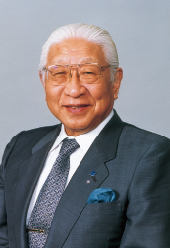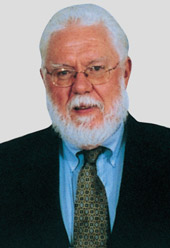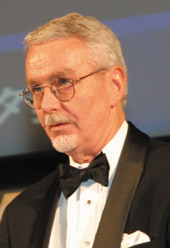Upon establishment of KCGI, we received many words of encouragement from people in Japan and overseas for our new challenge in IT education.

incorporator
Founder of HORIBA CORPORATION
Dr. Masao Horiba (deceased)
HORIBA's corporate motto is "Joy and Fun". The fact we select this statement indicates that the prevailing mentality in Japan is to view both acquisition of learning and technology and working as "difficult" and "tiresome".
Learning, aquiring skills, and working in manufacturing are fun in nature. The education values in Japan does not teach this fun aspect.
Humans are naturally curious creatures, compared to other animals. Therefore, based on this human nature, it should be the starting point of education "to nurture interests and curiosity".
It is an important aspect of intellectual education to show the joy of finding the truth and the fun of honing one’s skills.
There are more than 600 universities in Japan, but not all students studying at these universities become researchers. Since 80% of the students go out into the world, work for themselves or work in the industry. General universities need to be more sensitive to the "needs of society". They turn a blind eye to this, and continue to provide an old-fashioned education. This is the reason why the education offered is not vibrant.
"Live education” means "practical learning and skills" and also "contemporary learning and skills” suitable for the new era. However, I don't believe in the so-called "on-the-job training". If you have an academic foundation, you can absorb any technology. Real education is especially important in the rapidly evolving world of technology, such as computers. I hope that The Kyoto College of Graduate Studies for Informatics focuses on the fundamentals of real education, and develops into a graduate school that offers the "living education and technology" with "joy and fun".
At present, reforms such as the conversion of universities into independent administrative corporations are being carried out, but in the future, the ability of educational administrators will be challenged as to how they can operate universities and graduate schools independently.
Until now, in the establishment of universities and graduate schools, emphasis has been placed on the evaluation of the content of education and the thesis and achievements of individual professors. This time, professional graduate schools, etc. are recommending the appointment of practitioners to the faculty, but simply expanding the scope of employment of teachers does not go beyond improvement.
The core of the reform is the leadership of the university, which is the ideal and philosophy of the university and the vision of the era in which it will operate. I would like to see a graduate school that can be a model for a new type of professional graduate school.
In Kyoto, there are many large venture companies, but in Kyoto, there is a tradition of authenticity and a foundation for innovation.
In this sense, we can say that the establishment of a professional graduate school for the development of practitioner found the right location.
Finally, in the Kyoto dialect, I would like to conclude by saying, "This kind of graduate school should be done as soon as possible, before anything else.".
At the establishment of The Kyoto College of Graduate Studies for Informatics in 2003
Passed away on July 14, 2015

incorporator
First Vice President, Rochester Institute of Technology, USA
Late Dr. Stanley D. McKenzie
Stanley D. McKenzie, Ph.D.
Provost Emeritus
Rochester Institute of Technology
"The Kyoto College of Graduate Studies for Informatics (KCGI)" is currently proposing a graduate program focusing technologies that will change the way we manage people. This is an area that is not yet clearly defined, but is called "Web business" (or e-business) technology. Despite the tremendous impact these technologies have on a wide variety of businesses and industries, few universities in Japan offer such programs. These types of programs may be offered in business schools, but because the subjects that need to be covered in these programs are highly specialized by nature, few business schools have teachers with such high technical expertise.
In technical schools, teachers have little to do with the business world, so technical schools are reluctant to accept such programs. Engineering faculty are more interested in using computer technology to handle engineering problems rather than working on business problems.
This vacuum is usually filled with education courses and services from IT vendors such as Cisco, Oracle, Fujitsu and NEC. However, KCGI believes that Web business technology programs should be taught by legitimate educational institutions. KCGI also believes that such programs should contain more technology-related material than is currently contemplated and that schools like KCGI, which have a large number of technology education professionals, should play a more important role.
Therefore, I would like to express my strong support for KCGI to start the "web-based business technology" program as the first program in graduate school.
At the establishment of The Kyoto College of Graduate Studies for Informatics in 2003
Passed away on November 8, 2016
